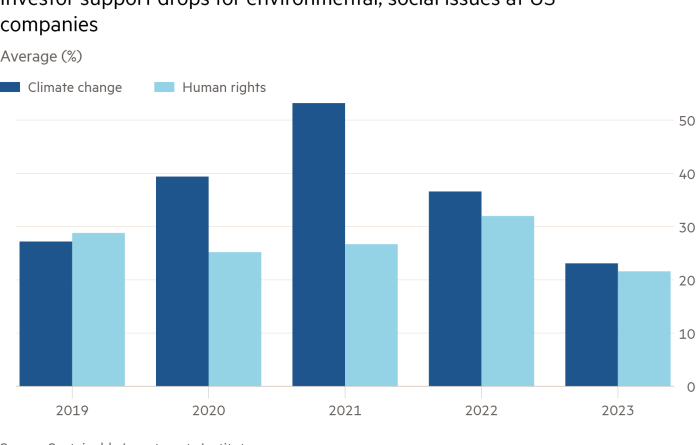
Investor support for environmental and social activism plunged at the annual meetings of US companies this year, reflecting hesitancy in the face of increasingly prescriptive proposals and mounting political pressures.
The waning enthusiasm was evident at a wide variety of companies, including Amazon, ExxonMobil and United Parcel Service.
Petitions calling on US companies to do more on climate change averaged 23 percent support from shareholders this year through the end of May, down from 36.6 percent last year. according to the Sustainable Investments Institute, a nonprofit data provider. Shareholder proposals on human rights got 21.6% of the votes cast, compared to almost a third in 2022.
Shareholder proposals, typically non-binding in the US, have increasingly become an advocacy tool for religious organizations, environmentalists and other socially engaged investors. A record number is expected this year, according to The Conference Board and data from Esgauge, a research group.
A US policy change in 2021 has allowed more petitions to go to a vote. As a result, proposals have evolved from innocuous disclosure requests to specific demands for action by companies.
Although the number of requests has increased, support has not grown correspondingly. Just five US shareholder resolutions on social and environmental issues have won majority support from company shareholders this year, down from more than 35 in 2022 and 2021, the Institute for Sustainable Investments said.

“We’ve seen an increase in more transparent corporate disclosures, particularly by larger companies, along with an increase in overly prescriptive proposals appearing on company ballots,” said Benjamin Colton, chief executive of State Street Global Advisors, the $3.6 billion asset manager. “Our observation is that these dynamics have led to a general decline in investor support for environmental and social shareholder proposals.”
Just 11% of Exxon shareholders last week backed a petition to set emissions reduction targets consistent with the Paris climate accord, down from 28% last year. At Amazon, a resolution calling for more information about the risks of plastic packaging received less than a third of shareholder support, down from nearly half last year.
Support for a proposal on diversity, equity and inclusion in UPS’s shipping business was 25% this year, down from 37% in 2022.
The shareholder vote business has also been embroiled in political struggles over the rise of environmental, social and governance (ESG) investing. Florida Gov. and presidential candidate Ron DeSantis signed a law last month requiring the state’s pension funds to vote only actions on “pecuniary factors.” Senate Republicans in December accused asset managers BlackRock, Vanguard and State Street of using shareholder voting power “to advance liberal social goals.”
Publicly, the big asset managers have said the political attacks have not changed their voting policies, said Matteo Tonello, CEO of The Conference Board. But, “I think their response to the backlash has led them to be a little more cautious and sensitive to the implications that these [voting] policies have”.
The picture is different outside the US. According to data provider Diligent, average support for European companies’ environmental and social proposals rose to 11.6% in 2023 from 10.6% last year and 5.5% of 2021. Fewer shareholder proposals are presented in Europe: only eight environmental or social proposals were voted on until May 31.
Support for environmental and social resolutions outside Europe and the US was 17% this year, up from 11.3% last year, according to Diligent.
US conservative activists have also filed a record number of shareholder proposals since the SEC’s policy change. Its problems have also failed to garner support from institutional investors and asset managers.
BlackRock said its shareholder vote has always focused on delivering “long-term financial value for our clients.” The company’s support for shareholder requests had fallen last year. Colton of State Street said the asset manager’s voting record has remained “very consistent over the years.”
Vanguard declined to comment.
Abortion-related petitions filed after the US Supreme Court struck down federal abortion rights last year failed to garner more than 12 percent support from Tenet Healthcare, American Express and Eli Lilly. At insurer Travelers, a proposal calling for the company to set a deadline to stop underwriting new fossil fuel projects won 8.8% support in May, down from 13% support in last year. Proxy adviser Institutional Shareholder Services said the company has disclosed most of what the shareholder petition demanded.
Shareholder proposals are “increasingly prescriptive,” said Brian Bueno of Farient Advisors, a consultancy. For organizations that typically submit more requests, “what they were doing this year clearly didn’t work,” he said. “We’re going to end up seeing that their efforts didn’t work as well this year as they did in previous years.”
Additional reporting by Brooke Masters in New York
[ad_2]
Source link





